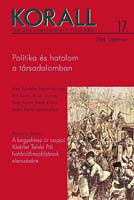Fedák Sári, mint „emlékezeti hely.” A bulvárszínházi kulturális örökség átértékelése
Sári „Zsazsa” Fedák (1879–1955), as a “Place of Memory”. On the Necessity of the Revaluation of the Hungarian Boulevard Theatre Tradition
Author(s): Gyöngyi HeltaiSubject(s): Cultural history
Published by: KORALL Társadalomtörténeti Egyesület
Keywords: social history; Hungary; 20th century; operetta; gossip column; socialist culture
Summary/Abstract: This study focuses on the mechanisms of the cultural appropriation of an important mass culture personality in the context of the totalitarian communism. It claims that the locally and internationally recognised Hungarian boulevard theatre tradition of the 1920–1944 period was forcefully discredited as “bourgeois” after 1949, when Hungary became a part of the Soviet Empire and when the socialist realist aesthetics invaded even the music theatre practice. For demonstrating the cultural and political importance of this forgotten profane tradition, the paper examines the case of the greatest Hungarian operetta prima donna of the first half of the twentieth century, by using the concepts of “place of memory” (Pierre Nora) and “circulation of the social energy (Stephen Greenblatt). In the introduction the study outlines how Sári „Zsazsa” Fedák has functioned as a place of memory during her forty years of carrier and explains by example some extra theatrical, political meanings of her personality, of her roles, of her hits, by presenting and commenting a few citations from the well known theatre weekly of the pre-war period, the Színházi Élet. In the first part, the study tries to show that is was precisely her “place of memory” status, why Sári „Zsazsa” Fedák had been chosen as a symbolic figure for the communist political propaganda campaign, fought against the cultural heritage of the “Horthy era”, the 1920–1944 period, stigmatised as “fascist.” By using literary analyses, the study examines how the communist cultural politics has appropriated the genres and the devices of the condemned boulevard tradition in order to undermine the popularity of Fedák and the whole mass culture tradition represented by her, to bind it to fascism and to declare the necessity of the total renewal of the light entertainment, based on socialist realism. The study explores how the well known operetta lyrics, attached to the legendary roles, interpreted by Fedák were parodied, politicised in the communist humour magazine Ludas Matyi in the 1945–1947 period, in order to alienate the audience from the actress, who was first condemned to prison by the people’s tribunal, than banned from the socialist stage forever and evacuated from Budapest. The paper concludes by analyses of three detailed secret reports, written about Fedák’s funeral in 1955. These official reports reveal how, despite the artificial erasure of the actress form the public discourse, the communist Party was afraid of the reactivation of her memory, even ten years after her banning from the stage. Using these reports the study exposes how the actors and spectators, who organised her funeral, used this occasion for contesting the official depreciation of Fedák and for emphasising her “place of memory” status.
Journal: Korall - Társadalomtörténeti folyóirat
- Issue Year: 2004
- Issue No: 17
- Page Range: 167-192
- Page Count: 26

